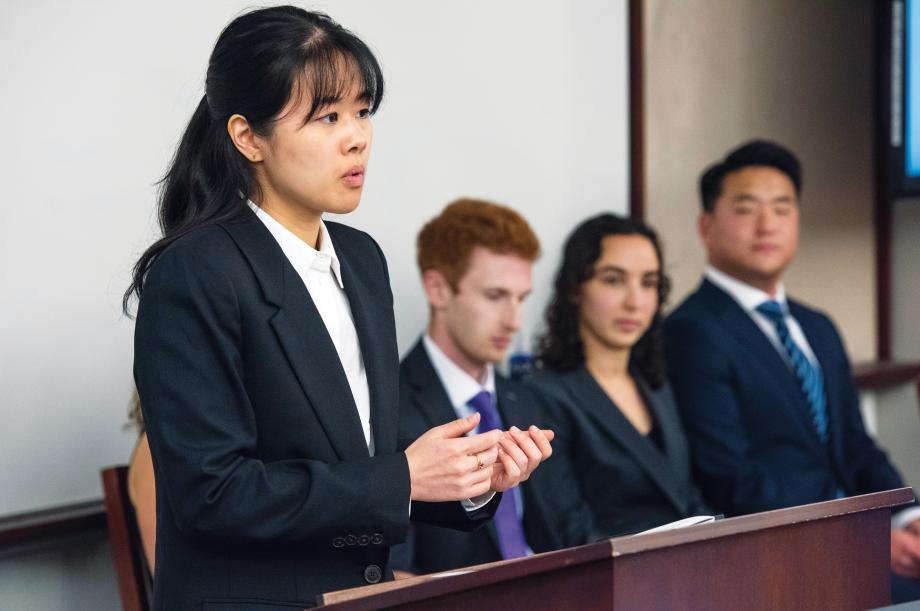Student Q&A: Georgia Huang, ’24

Working in the Law School’s Federal Criminal Justice Clinic (FCJC), Georgia Huang, ’24, and several of her classmates had the opportunity to collaborate with Clinical Professor of Law Alison Siegler, faculty director of the clinic, on the first comprehensive national investigation of federal pretrial detention. The resulting report, Freedom Denied: How the Culture of Detention Created a Federal Jailing Crisis, concluded that federal judges routinely violate the very bail laws that they are tasked with upholding.
With many clinics to pick from at the Law School, why did you pick the FCJC?
I was drawn to the FCJC for several reasons. First, I saw that the FCJC had three professors leading three project teams, each working to improve the federal criminal system from a different angle. The ability to gain experience with individual client representation, impact/ litigation, and system-change work—all within one clinic—was highly attractive to me. Second, I was blown away by the dedication and the brilliance of the people in the FCJC. During my 1L year, I saw a lot of coverage of the fake stash house litigation, where the clinic developed a creative litigation strategy to challenge the racially selective practices of the ATF. The opportunity to do such impactful work as a law student was super exciting.
“I am certain this will make me a more effective litigator and advocate when I practice.”
Georgia Huang, ’24
Can you describe your work relating to Freedom Denied? How did that experience impact you?
One of the best parts of being on Professor Siegler’s Freedom Denied report team is that I got to be involved in almost every step along the way: coauthoring speeches and presentations for hundreds of federal judges and thousands of federal public defenders at national conferences; writing a letter describing our findings to the Judicial Conference of the United States; designing the Freedom Denied website with an eye towards a generalist audience; and even building an Excel model to analyze polling data.
At the end of the year, my team members and I got to present our findings to Senator Dick Durbin (D-IL), the Chair of the Senate Judiciary Committee, and to engage in a productive discussion about bail reform. This was easily one of the highlights of my 2L year. It was inspiring to hear Senator Durbin talk about his dedicated efforts to address issues of overincarceration and racial disparities within the federal criminal system.
What made this project meaningful for you?
It means a lot to me to know that we are making a real impact on real people’s lives. Each federal magistrate judge that we convince of our findings has the potential to impact hundreds of people: to ensure that counsel is properly appointed and that pretrial detention is ordered only when warranted. Being able to take all the different skills I’ve learned throughout law school, synthesize them, and apply them towards such an important goal has also been quite meaningful. Working in the clinic really bridges the gap between theory and practice and has taught me so many skills that will serve me incredibly well as a lawyer.
How has your participation in the FCJC prepared you for practice?
My participation in the FCJC has really strengthened my communication skills. For instance, I’ve had a lot of practice learning to write for different audiences over the past year, whether it’s a judge, a legislator, a defender, or the general public. I spent a lot of time tailoring my writing to the right level of expertise and thinking hard with Professor Siegler about what we want a specific audience to take away from a presentation or a letter. I am certain this will make me a more effective litigator and advocate when I practice. I also loved working in a collaborative and feedback-heavy environment. My peers and I are constantly editing and refining each other’s work, and being in a clinic with three amazing professors means that I get to benefit from all their insights.
What’s something that has surprised you in your participation in the report or in your clinical experience in general?
I’ve been surprised by how easy it can be for an unlawful practice to become entrenched due to the repetition of “this is just how we do it,” or eventually “this is just how we’ve always done it.” For example, we observed courts failing to hold the prosecution to its burden of invoking a statutory basis for pretrial detention and instead ordering detention based on vague arguments about “dangerousness.” And in some cases, the defense would simply agree. It can be difficult for someone within the system to push back on that. I am glad that our report has helped kickstart a lot of change in this regard.
What are your plans after you graduate next spring?
After graduating, I will be clerking in Washington, D.C., for two years, starting with Judge Taranto on the US Court of Appeals for the Federal Circuit in 2024 and then with Judge Millett on the US Court of Appeals for the DC Circuit in 2025.